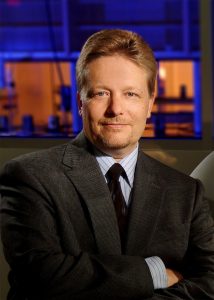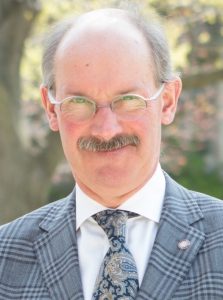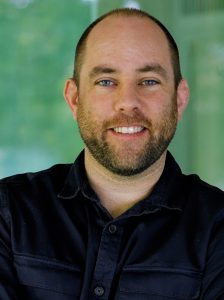The following are biographical sketches and candidacy statements for candidates nominated for the annual ECS officers’ election.
Candidate for President | Candidates for Third Vice President
Candidate for President
 Eric Wachsman is Director of the Maryland Energy Innovation Institute and Crentz Centennial Chair in Energy Research with appointments in both the Materials Science and Chemical Engineering departments at the University of Maryland, U.S. Prior to Maryland, he was the Rhines Chair Professor in Materials Science at the University of Florida, U.S., and a Senior Scientist at SRI International. He received his PhD in Materials Science from Stanford University in 1990, and MS and BS degrees in Chemical Engineering from Stanford and the University of California, Berkeley, respectively. His research is focused on solid ion-conducting materials and electrocatalysts, including the development of solid state batteries, solid oxide fuel cells and electrolysis cells, ion-transport membranes, and solid state gas sensors, with over 270 publications and 35 patents/patent applications. To date, three companies have been founded based on these technologies.
Eric Wachsman is Director of the Maryland Energy Innovation Institute and Crentz Centennial Chair in Energy Research with appointments in both the Materials Science and Chemical Engineering departments at the University of Maryland, U.S. Prior to Maryland, he was the Rhines Chair Professor in Materials Science at the University of Florida, U.S., and a Senior Scientist at SRI International. He received his PhD in Materials Science from Stanford University in 1990, and MS and BS degrees in Chemical Engineering from Stanford and the University of California, Berkeley, respectively. His research is focused on solid ion-conducting materials and electrocatalysts, including the development of solid state batteries, solid oxide fuel cells and electrolysis cells, ion-transport membranes, and solid state gas sensors, with over 270 publications and 35 patents/patent applications. To date, three companies have been founded based on these technologies.
He has contributed to the next generation of electrochemists having graduated 34 PhD and 30 MS students, supervised 38 postdocs and research scientists, and mentored several junior faculty. Of these, three have gone on to receive ECS awards. His involvement with students includes founding and serving as Faculty Advisor for ECS student chapters at both the University of Florida and the University of Maryland, with the Maryland chapter winning Outstanding ECS Student Chapter Awards in 2013 and 2017, and ECS Student Chapter of Excellence in 2014, 2015, and 2016.
Dr. Wachsman is a Fellow of The Electrochemical Society (2008) and the American Ceramic Society (2012), and elected member of the World Academy of Ceramics (2017). He received the 2017 ECS Carl Wagner Award; 2014 Sir William Grove Award (International Association for Hydrogen Energy); 2014 Pfeil Award (Institute of Materials, Minerals & Mining); 2012 Fuel Cell Seminar Award; and 2012 ECS High Temperature Materials Division Outstanding Achievement Award.
Dr. Wachsman joined the Society as a graduate student in 1989 to present a paper in the first International Symposia on Solid Oxide Fuel Cells (SOFC-I). He quickly became active in ECS, organizing 16 symposia (he is currently the lead organizer for SOFC-XVII, July 2021), and serving on numerous ECS committees. He rose through the ECS High Temperature Materials Division (now H-TEMP) Executive Committee, chairing the division in 2006, and continued to chair Society committees (including the ECS Interdisciplinary Science and Technology Subcommittee) through his election as ECS Vice President in 2018. Dr. Wachsman served on the ECS Board of Directors from 2006-2007, and from 2013 through today.
Statement of Candidacy
I have been an active member of ECS at both the division and Society levels and am proud to have served multiple terms on the Board of Directors. My involvement has given me an understanding of the Society’s operations, successes, and challenges ahead. Importantly, it has also provided me with an understanding of ECS’s role in supporting its members, advancing science, and our contributions to society at large.
We live in a rapidly changing world with major societal issues such as the availability of affordable and sustainable energy, clean water and air, food, and in this last year, especially health. The solutions to these issues are at the nexus of science and technology, and becoming more electrochemical in nature. As such, developing symposia that address these grand challenges has been the focus of my efforts as Chair of the Interdisciplinary Science and Technology Subcommittee and since my election in 2018 as ECS Vice President. As a scientific society, ECS also faces challenges including the uncertainty of hosting live meetings, declining membership, and competition for our publications. Many of our members face challenges in obtaining adequate research funding which could be exacerbated by the economic impact of COVID-19.
Therefore, if elected President, my goals would be to continue to expand ECS participation in addressing major societal issues, and also provide the best possible benefits to our members. As a scientific society, we need to not only “Free the Science,” but partner with our sister societies to “Stand up for Science.” We are not policy makers, but we should make every effort to ensure that policy makers base their decisions utilizing the best available science. Wearing a mask and social distancing under the current pandemic, while an inconvenience, should be a societal norm and not a political issue.
Moreover, we should invite more policy makers and funding agency representatives to ECS meetings to provide an opportunity for dialogue, as well as an opportunity for our members to learn of new funding opportunities and trends. We need to continue to increase the impact of ECS publications and maintain their reputation for quality—and give greater free access as a membership benefit. Moreover, our student members are the future of our Society. Every effort must be made for them to decide, such as I did over 30 years ago, to make ECS their scientific home.
Candidates for Third Vice President
 Peter Mascher received a PhD in Engineering Physics in 1984 from the Technische Universitä t Graz (TUG), Austria, and in 1989, joined McMaster University in Hamilton, Canada. A professional engineer, Dr. Mascher is Professor in the Department of Engineering Physics which he chaired from 1994 to 2000. From 2003 to 2014, he served as Associate Dean (Research and External Relations) of the Faculty of Engineering. Since 2014, he has overseen McMaster’s International Portfolio as Vice-Provost, International Affairs. Dr. Mascher is a Fellow of The Electrochemical Society and Fellow of the Canadian Academy of Engineering.
Peter Mascher received a PhD in Engineering Physics in 1984 from the Technische Universitä t Graz (TUG), Austria, and in 1989, joined McMaster University in Hamilton, Canada. A professional engineer, Dr. Mascher is Professor in the Department of Engineering Physics which he chaired from 1994 to 2000. From 2003 to 2014, he served as Associate Dean (Research and External Relations) of the Faculty of Engineering. Since 2014, he has overseen McMaster’s International Portfolio as Vice-Provost, International Affairs. Dr. Mascher is a Fellow of The Electrochemical Society and Fellow of the Canadian Academy of Engineering.
As the William Sinclair Chair in Optoelectronics, Dr. Mascher leads active research groups involved in the fabrication and characterization of thin films for optoelectronic applications, the development and application of silicon-based nanostructures, and the characterization of defects in solids by positron annihilation spectroscopy. His research has been continuously funded for more than 30 years by the Natural Sciences and Engineering Research Council of Canada (NSERC) and has also drawn funding from the Canada Foundation of Innovation (CFI), several federal and provincial Centres of Excellence, and industry, for a lifetime total surpassing $25M.
Dr. Mascher has supervised more than 85 graduate students and post-doctoral fellows, authored or coauthored close to 250 publications in refereed journals and conference proceedings, and presented many invited lectures at international conferences and workshops. From 2003 to 2007, he served as Program Director of the Ontario Photonics Consortium, at the time the largest ever Ontario-funded project.
Statement of Candidacy
I have been an active member of ECS for the past 30-plus years, initially as a participant and presenter at the biannual ECS meetings. Over the years, I have organized and co-organized close to 20 topical symposia. In 2010, together with David Lockwood, I initiated the International Symposium on Nanoscale Luminescent Materials, now in its seventh edition. In 2005, I joined the governing body of the ECS Dielectric Science and Technology (DS&T) Division. I was named the Awards Chair in 2010, then moved through Secretary to Vice Chair, and currently serve as Division Chair. I have been a Technical Editor for the ECS Journal of Solid-State Science and Technology (JSS) since 2017.
I greatly value the strong multi- and inter-disciplinary flavor of the ECS meetings. If elected, I would work with the ECS Board of Directors to preserve the wide range of topics while exploring avenues to streamline the meeting programs. The current pandemic has forced us to implement dramatic changes to how meetings are conducted, and we need to make sure that we remain open to adopting new modalities of scientific interaction even in a post-pandemic environment. One of the drivers undoubtedly will be considerations of the environmental footprint of large-scale travel. New hybrid modalities will also allow us to expand the reach of our meetings to non-traditional and under-represented constituencies, thereby addressing a key aspect of the drive towards equity, diversity, and inclusion. Input and feedback from the wider ECS membership will be critical in accomplishing this task.
ECS meetings are highly international, which makes them very attractive for graduate students and early career researchers, as they provide a forum for information exchange, the development of collaborations, and gaining greater global awareness. It will be important to continue to provide support for students to participate in the meetings and to highlight their accomplishments. Through the years, I have always looked forward to adjudicating the student poster competitions and tremendously enjoyed my conversations with the presenters.
As a JSS Technical Editor, I have come to appreciate the often extraordinarily high quality of submissions to the journal, which is reflected in the steadily increasing impact factors. If elected, I would remain interested in enhancing the quality of the ECS publications and work with the Board and the journal editors on the establishment of new, thematically focused journals. In the current climate of science skepticism, even greater emphasis needs to be placed on the Free the Science initiative to maintain and enhance ECS’s societal impact.
In summary, I would be honored to serve the ECS community as a Vice President in a collegial and inclusive manner and with a strong focus on attracting new members from among early career researchers, students, and under-represented groups. This, together with highly interdisciplinary biannual meetings and strong and widely accessible journals, will ensure a vibrant and relevant Society for years to come.
 Colm O’Dwyer is Professor of Chemical Energy in the School of Chemistry at University College Cork (UCC), Ireland, and Principal Investigator at Tyndall National Institute, the Environmental Research Institute, and the Advanced Materials and BioEngineering Research Centre.
Colm O’Dwyer is Professor of Chemical Energy in the School of Chemistry at University College Cork (UCC), Ireland, and Principal Investigator at Tyndall National Institute, the Environmental Research Institute, and the Advanced Materials and BioEngineering Research Centre.
Prof. O’Dwyer received his PhD with Prof. D. Noel Buckley in 2003 on semiconductor electrochemistry and physics, and conducted postdoctoral research on ultracold atom cooling and surface science in Toulouse, France. Since 2008, as a Science Foundation Ireland Stokes Lecturer on Nanomaterials (2012-present), he now leads a multidisciplinary research group at UCC developing 3D printed batteries, energy storage materials, optoelectronic materials and processes, and photonic structures. His current research interests include 3D printed energy storage devices and real-time photonics for examining optoelectronic materials and battery materials. He is a Fellow of the Institute of Physics. In 2017 he received the Bell Labs Prize. Over the years, Prof. O’Dwyer has coauthored, with talented students, postdocs, and collaborators, over 230 peer-reviewed articles (27 in JES and JSS), numerous book chapters, and 60 ECS Transactions articles, covering most of the Society’s technical interest areas.
Prof. O’Dwyer has been an ECS member for nearly 20 years, since his first experience as a graduate student attending the 199th ECS Meeting in Washington, D.C., in 2001. He has served ECS continuously since then in many roles. Prof. O’Dwyer organized or co-organized over 35 ECS symposia in electrochemical and solid state topics since 2007. Through the ECS Interdisciplinary Science and Technology Subcommittee, he helped deliver new mega-symposia across several ECS divisions. He has served the ECS Electronic and Photonics Division as an Executive Committee Member for over 12 years, and more recently as 1st Vice Chair and then Division Chair. A member of several key Society committees, he has also been on the Board of Directors. As an award-winning advocate of open access publication, Prof. O’Dwyer guest edited four special JES and JSS focus issues on semiconductor electrochemistry, thermoelectrics, and 2D materials and devices.
Statement of Candidacy
One of ECS’s many strengths is the diversity in the community we see at meetings, committees, divisions, and in the pages of our journals, magazine, blog, and social networks. Our annual meetings showcase the multidisciplinary nature and collegiality that makes this Society a premier venue to advance electrochemical and solid state science and technology.
ECS is a non-profit organization that exists for its members and the wider community to disseminate the advances that so many people make for the sake of a better, healthier, safer, and greener future. Disseminating this know-how is a keystone of our mission. The Free the Science initiative is a visionary approach to open access publication. ECS set the bar in accessibility for authors and readers. My commitment to all members is to lead ECS to maximize accessibility to all authors across academia and industry R&D—especially early career researchers, industry professionals, and underrepresented groups—so that the science and technology ECS showcases is diverse beyond standard metrics.
Our world has changed in 2020 due to the COVID-19 pandemic. The way our community interacts, works, and shares knowledge, may have changed forever in some ways. The success of the online element of our 2020 PRiME Meeting was very encouraging, providing ECS with wonderful opportunities to broaden accessibility and engagement, especially where meeting attendance is difficult for many. If elected as our Vice President, I am committed to lead ECS with your support, to adapt our engagement to a larger community worldwide. We often say our children’s future motivates everything, and it takes a village to raise a child. This is true within ECS, and my responsibility as part of the leadership is to provide the platform for our younger colleagues. In disseminating knowledge and core values, I plan to put in place strategies to boost social media interactions and the methods of communication of our student members who are the future leadership in our Society and society in general. As Vice President, I will advocate for programs to elevate our STEM education and outreach in all its forms, science communication, and the attractiveness of our journals, that mesh with the professional culture of our younger members and established members alike. If elected as our Vice President, I pledge to engage with our divisions, other Societies, funding agencies, policy makers, and our student chapters to ensure that diversity in our people and programs grows and thrives.
It is an honor to be nominated, and if elected, my professional and personal pledge is to serve ECS and the interests of all divisions, you the members, and our wider community, to bolster engagement and governance so that we are resilient in the coming few years. Thank you for considering my candidacy.
